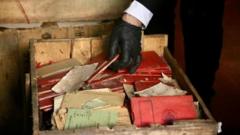In a startling revelation, workers unearthed crates filled with Nazi documents in the basement of Argentina’s Supreme Court as they prepared to relocate archival materials to a new museum. The documents, dated back to June 20, 1941, were sent through 83 diplomatic pouches by the German embassy in Tokyo aboard a Japanese steamship. These crates made their way to the court after Argentine customs officials intercepted them, finding Nazi propaganda within five randomly opened pouches, according to court officials.
Upon investigation, the workers discovered the wooden crates, intriguingly packed like champagne boxes, and found materials aimed at spreading Adolf Hitler's ideology within Argentina during World War II. The court has since secured the crates and notified the Buenos Aires Holocaust Museum to assist in inventorying the contents, which are expected to include photographs and membership booklets emblazoned with swastikas.
Historians involved with the archive hope that these documents will offer valuable insights into the financial connections and international networks of the Nazis. The Supreme Court has outlined details of the documents, noting that they had been classified as “personal effects” by the German embassy but raised suspicions among customs officials due to their size. Consequently, five packages were inspected, revealing postcards, photographs, and various Nazi propaganda items.
The German embassy’s request for the return of the documents to Tokyo was thwarted by an Argentine judge, who ordered their seizure in September 1941. As Argentina decided on these pouches’ fate, relations with Axis powers deteriorated, leaving the documents to sit undisturbed in the court's basement for years. Following World War II, Argentina became a sanctuary for several high-ranking Nazis, including infamous figures like Adolf Eichmann and Josef Mengele. President Fernando de la Rúa publicly acknowledged the country’s past in 2000, apologizing for its role as a refuge for war criminals.


















